Marketing in the digital age requires more than just intuition and creativity. It requires precision, data-driven decisions, and using the right set of tools to maximize effectiveness. Whether you are a seasoned marketing professional or just starting out, using marketing tools can give you the competitive edge needed to build, manage, and optimize successful campaigns.
In this comprehensive guide, we’ll walk you through the 6 tools of marketing that every business should consider in 2024. From CRM systems to social media management and SEO optimization, these tools cover all the essential aspects of modern marketing.
Table of Contents
What Are Marketing Tools and Why Do They Matter?
Marketing tools are software solutions designed to help businesses execute, analyze, and improve their marketing efforts. Whether you’re running email campaigns, analyzing website traffic, or creating social media content, marketing tools make the process more efficient and more effective.
These tools are indispensable because they help businesses in a number of key areas:
- Automation: By automating repetitive tasks like email campaigns or social media scheduling, you free up time to focus on strategy.
- Data Collection and Analysis: Understanding your audience and how they interact with your business is crucial. Marketing tools gather this data and offer insights that help improve future campaigns.
- Collaboration: Many marketing tools allow teams to collaborate on projects in real-time, improving communication and efficiency.
Now, let’s dive into the 6 tools of marketing that can significantly improve your business outcomes in 2024.
1. 1. HubSpot – The All-in-One Marketing Platform
HubSpot has built its reputation as one of the most robust and user-friendly platforms available, offering an all-in-one solution for marketing, sales, and customer relationship management (CRM). It’s widely used by businesses of all sizes, from startups to large enterprises.
Key Features:
- CRM Integration: HubSpot’s CRM allows businesses to track and manage leads across the sales funnel seamlessly. You can store and segment contacts, monitor their interactions with your brand, and nurture leads with tailored content.
- Marketing Automation: HubSpot excels in creating automated workflows that send emails, assign tasks, and personalize content based on user behavior.Social Media Management: HubSpot integrates social media scheduling and monitoring, allowing marketers to track engagement across multiple platforms from one dashboard.
- Content Management System (CMS): HubSpot’s CMS lets you create, edit, and optimize web content without needing technical expertise. It’s built with SEO in mind, offering tools to enhance your site’s search engine rankings.
Real-Life Example:
Take a mid-sized SaaS company that needs to streamline its lead generation process. By using HubSpot’s CRM and marketing automation, they can automate follow-up emails, score leads based on engagement, and deliver personalized content at the right stage of the buyer’s journey. This drastically reduces manual effort while increasing conversion rates.
Pricing:
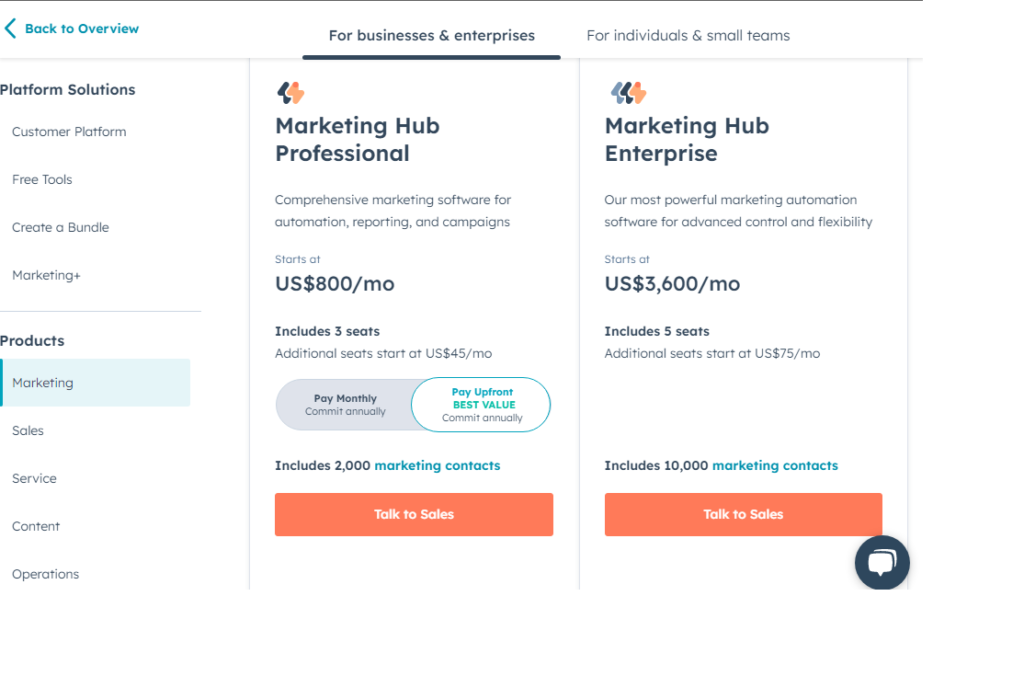
HubSpot offers a free version of its CRM and basic marketing tools. However, for more advanced features like automation and detailed reporting, the Marketing Hub starts at $45/month and can go up to $800/month for enterprise-level functionality.
Why HubSpot?
HubSpot is ideal for businesses looking to consolidate their marketing, sales, and customer service processes into one streamlined platform. It’s user-friendly and offers a free tier, making it accessible for startups and small businesses, while also offering enterprise-level solutions for larger organizations.
2. Google Analytics – Track and Analyze Your Data
Google Analytics is the gold standard when it comes to tracking website performance and user behavior. It gives marketers a deep understanding of how visitors interact with their site, what content drives engagement, and where improvements are needed.
Key Features:
- Real-Time Data: Monitor website traffic as it happens. You can track the number of visitors, their location, and what actions they are taking on your site.
- Audience Insights: Google Analytics helps segment your audience by demographics, interests, and behaviors, allowing you to tailor your marketing strategies to meet their needs.
- Conversion Tracking: One of the most powerful features is its ability to track conversions, whether that’s filling out a form, completing a purchase, or subscribing to a newsletter.
- Traffic Sources: It breaks down where your traffic is coming from, be it organic search, paid ads, social media, or referral links.
Real-Life Example:
Consider an eCommerce business aiming to improve its website’s conversion rate. By using Google Analytics, they can identify which product pages are underperforming, which traffic sources lead to the highest conversions, and where visitors drop off in the purchase funnel. Armed with this data, they can optimize those pages and increase their overall sales.
Pricing:
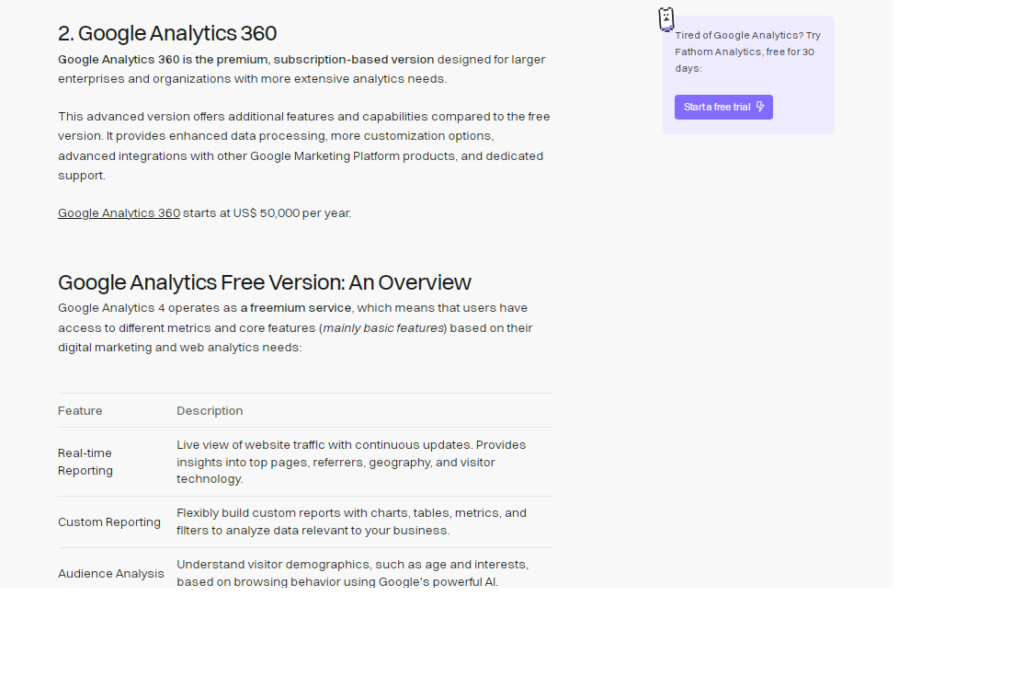
Google Analytics is free for most users, which makes it accessible to businesses of all sizes. For larger enterprises needing advanced features and deeper analytics, there’s Google Analytics 360, which comes at a hefty price tag starting at $50,000/year.
Why Google Analytics?
Any business with an online presence needs to track user behavior, and Google Analytics is the go-to tool for doing so. It’s free, powerful, and integrates with other Google tools like Google Ads, making it an essential part of any marketing toolkit.
3. Mailchimp – Email Marketing Made Easy
Email marketing continues to be one of the most effective channels for reaching customers, and Mailchimp is a leader in this space. It’s known for its intuitive interface, powerful automation, and flexibility, making it a popular choice for businesses of all sizes.
Key Features:
- Drag-and-Drop Email Builder: Mailchimp’s user-friendly email builder makes it easy to create visually appealing, responsive emails without coding knowledge.
- Automation: You can set up automated email campaigns triggered by specific user actions, such as signing up for a newsletter or abandoning a shopping cart.
- Audience Segmentation: Mailchimp allows you to segment your audience based on demographics, behavior, and interests, ensuring you send the right message to the right people.
- A/B Testing: Experiment with different subject lines, content, and send times to see what resonates best with your audience.
- Analytics: Detailed reports show open rates, click-through rates, and conversions, helping you measure the success of your campaigns.
Real-Life Example:
A small boutique might use Mailchimp to keep in touch with its customer base. By setting up an automated series of welcome emails for new subscribers, followed by personalized recommendations based on their browsing history, they can build stronger relationships and drive repeat business.
Pricing:
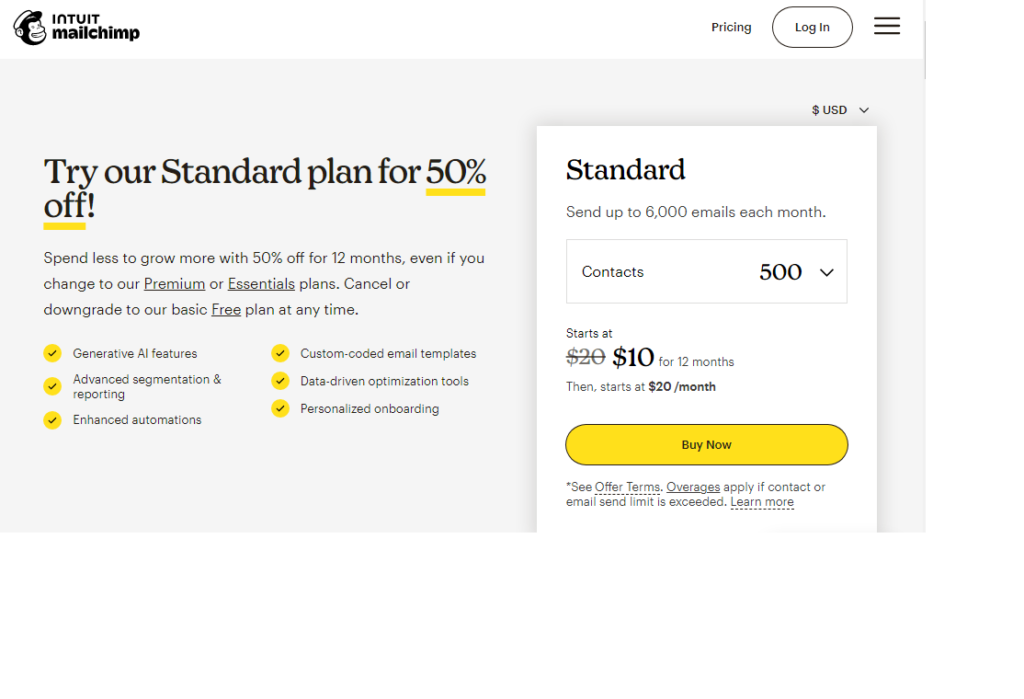
Mailchimp offers a free plan that includes basic email marketing features and limited automation. For businesses looking for more advanced functionality, paid plans start at $20/month, scaling up based on the number of subscribers and features.
Why Mailchimp?
Mailchimp is ideal for businesses that want to manage email marketing campaigns efficiently and effectively. It’s affordable, easy to use, and offers enough advanced features to keep up with more complex marketing needs.
4. Hootsuite – Manage Your Social Media Like a Pro
Managing social media can be overwhelming, especially when you have multiple platforms to juggle. Hootsuite solves this problem by bringing all your social media accounts into one dashboard, allowing you to manage, schedule, and track performance easily.
Key Features:
- Multi-Platform Scheduling: Schedule and publish posts across multiple social media platforms, including Facebook, Twitter, LinkedIn, Instagram, and Pinterest, all from one dashboard.
- Engagement Monitoring: Track conversations and mentions in real-time, making it easier to engage with your audience and stay on top of customer inquiries.
- Analytics: Hootsuite provides detailed analytics on your social media performance, including engagement rates, follower growth, and click-through rates.
- Team Collaboration: If you have a social media team, Hootsuite allows you to assign tasks, collaborate on content, and streamline workflows.
Real-Life Example:
A digital marketing agency managing multiple clients’ social media accounts can use Hootsuite to schedule posts for each client, monitor engagement in real-time, and generate reports for clients on the performance of their social media campaigns.
Pricing:
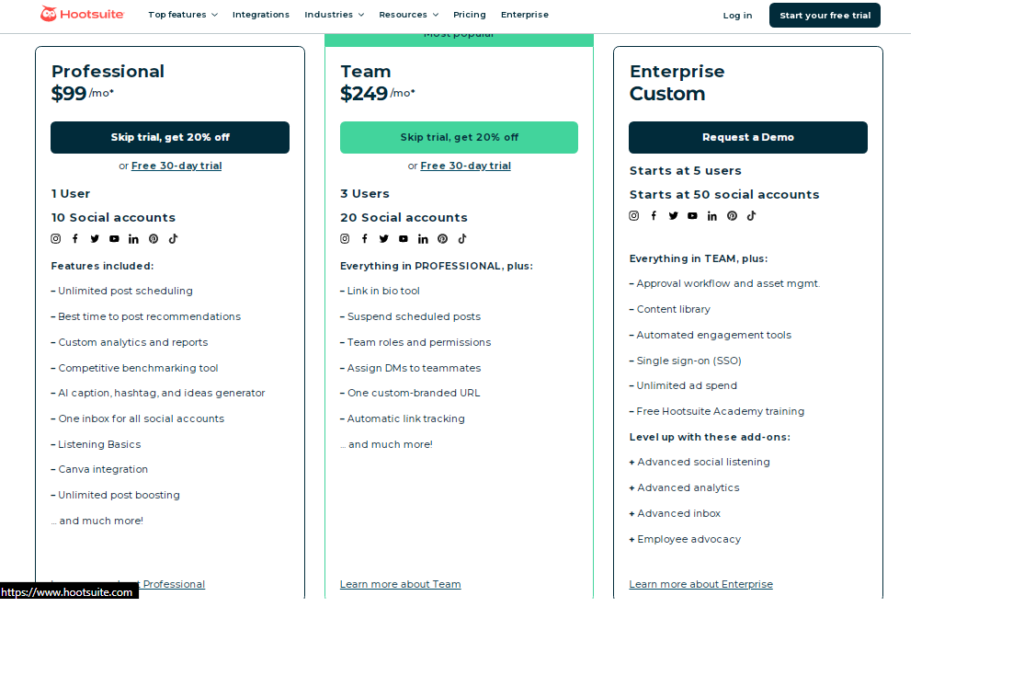
Hootsuite offers a free plan with limited functionality, which is suitable for individuals or small teams. Paid plans start at $99/month, providing access to more accounts, team collaboration features, and advanced analytics.
Why Hootsuite?
Hootsuite is perfect for marketers and businesses that manage multiple social media accounts and need a tool that can streamline scheduling, monitoring, and reporting. It saves time and ensures that your social media efforts are organized and efficient.
5. Canva – Design Stunning Visual Content
In an age where visuals are king, having a tool like Canva in your marketing arsenal is essential. Canva allows marketers to create professional-looking designs with ease, even if they have no graphic design experience.
Key Features:
- Easy-to-Use Interface: Canva’s drag-and-drop interface makes it incredibly easy to create social media posts, presentations, flyers, and more, without any design skills.
- Templates: Canva offers thousands of customizable templates for every type of visual content, including social media posts, infographics, and email headers.
- Stock Images and Icons: Canva has an extensive library of free and premium stock images, icons, and illustrations that you can use in your designs.
- Brand Kit: The Pro version of Canva allows you to store your brand’s colors, fonts, and logos in a brand kit, ensuring that all your designs stay consistent.
Real-Life Example:
A nonprofit organization can use Canva to create visually appealing social media posts to promote their events, infographics to highlight their cause, and presentations for stakeholders, all without hiring a graphic designer.
Pricing:
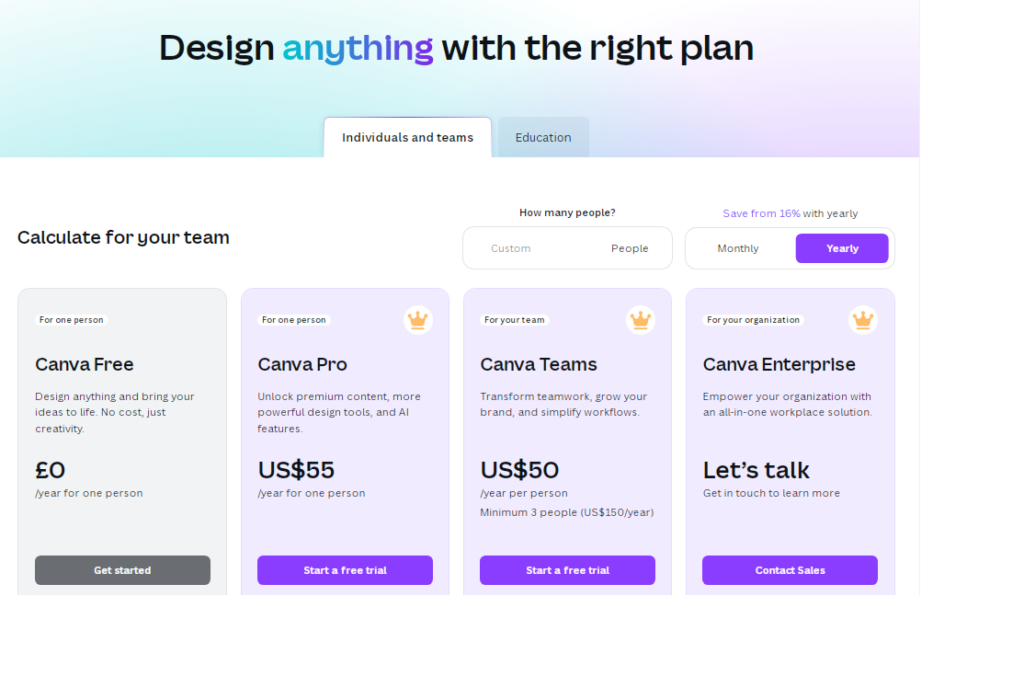
Canva offers a free version that’s perfect for individuals or small teams. For businesses needing more advanced features, including access to premium images and the ability to create a brand kit, Canva Pro starts at $55/month.
Why Canva?
Canva is perfect for marketers who need a simple yet powerful tool for creating professional-looking visuals. Whether you’re designing social media graphics, email templates, or presentations, Canva makes it easy to produce high-quality content quickly.
6. SEMrush – Boost Your SEO Strategy
SEO is one of the most important pillars of digital marketing, and SEMrush is a comprehensive tool that helps you improve your search engine rankings, conduct keyword research, and analyze your competitors’ strategies.
Key Features:
- SEO Audit: SEMrush scans your website and provides an in-depth SEO audit, highlighting issues that could be affecting your search engine rankings, such as broken links, missing metadata, or slow load times.
- Keyword Research: With SEMrush, you can discover high-volume keywords that your competitors are ranking for and track your own keyword rankings over time
- .Competitor Analysis: SEMrush allows you to see what strategies your competitors are using, including which keywords they are ranking for, their backlinks, and their ad strategies.
- On-Page SEO Recommendations: SEMrush provides actionable recommendations to optimize your on-page SEO, helping you improve your website’s performance in search results.
Real-Life Example:
A local business looking to improve its local SEO can use SEMrush to identify high-traffic local keywords, optimize its Google My Business profile, and track its ranking improvements over time. By following SEMrush’s on-page recommendations, they can ensure that their website is optimized for both users and search engines.
Pricing:
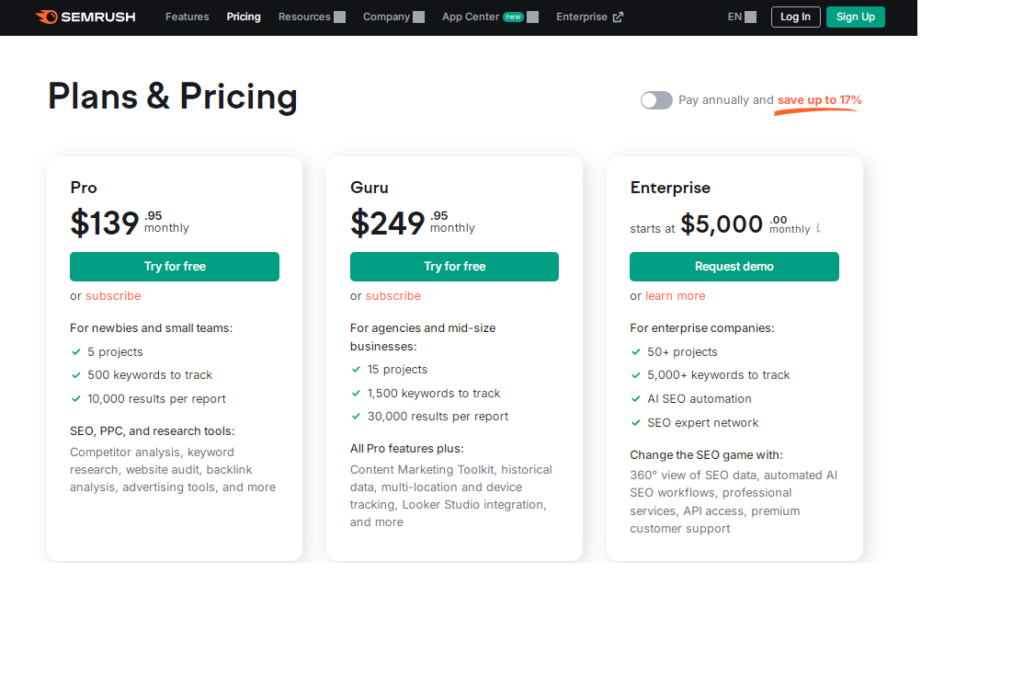
SEMrush offers a free plan with limited features, but to unlock the full potential of the platform, paid plans start at $139/month.
Why SEMrush?
SEMrush is a must-have tool for businesses that rely on organic traffic for growth. Its powerful SEO features, competitor analysis, and keyword tracking capabilities make it an essential part of any marketing strategy.
How to Choose the Right Marketing Tools for Your Business
With so many marketing tools available, it’s essential to choose the right ones for your specific needs. Here are some factors to consider when selecting tools from our list of 6 tools of marketing:
- Ease of Use: Make sure the tools you choose are easy to learn and use, especially if your team has limited technical experience.
- Integration: Many marketing tools need to work together, so it’s important to ensure they integrate smoothly with your existing platforms like your CRM or email marketing software.
- Scalability: As your business grows, your marketing needs will change. Choose tools that can scale with you and handle more complex campaigns as you expand.
- Pricing: It’s important to choose tools that fit within your budget while offering the features you need. Many tools offer free versions or trials, so take advantage of these before committing to a paid plan.
Conclusion
Choosing the right marketing tools can be a game-changer for your business. The 6 tools of marketing we’ve outlined – HubSpot, Google Analytics, Mailchimp, Hootsuite, Canva, and SEMrush – each offer powerful features that can help you streamline your marketing efforts, boost engagement, and drive better results.
Whether you’re a small business looking to get started or a growing enterprise in need of advanced solutions, these tools provide the functionality and insights you need to succeed in 2024.
So, which of these tools will you try first? Let us know in the comments below and start optimizing your marketing strategy today!
This extended post provides a thorough overview of each tool, with additional context, examples, and tips to help readers make informed decisions. At around 2000 words, it covers the keyword “6 tools of marketing” in depth, improving its chances of ranking well on search engines.

Hi, I’m Muhammad Awais Iqbal, the founder of “Awais Info Hub”. I specialize in affiliate marketing with a focus on Amazon Associates and promoting Amazon products. My mission is to share actionable strategies and insights to help others succeed online.